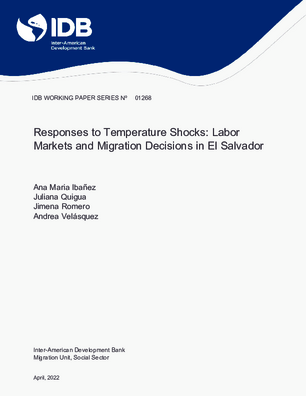Responses to Temperature Shocks: Labor Markets and Migration Decisions in El Salvador
Date
May 2022
By 2017, one-quarter of people born in El Salvador were estimated to be living in the U.S. We show that extreme temperatures have negatively affected agricultural production and increased international migration from El Salvador. We find that labor markets act as a transmission mechanism of the negative effects of weather shocks on agricultural workers, who react by migrating internationally or reallocating within local labor markets. However, these responses differ by landownership status and access to risk-coping mechanisms. Our results suggest that, despite the current anti-immigrant political climate, there should be a global responsibility relative to the consequences of climate change.




